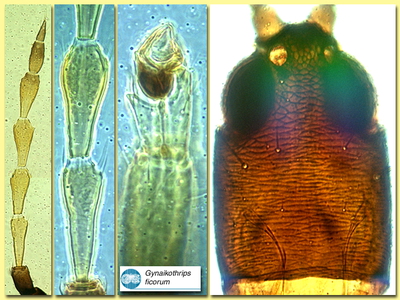Figures
Fig. 1 Antenna, fore tarsus and head (dorsal)
Fig. 2 Pronotum
Fig. 3 Meso- and metanotum
Fig. 4 Fore and hind wing
Fig. 5 Tergite I (pelta) and II
Species
Gynaikothrips ficorum Zimmerman
Biology
Induces leaf roll and leaf fold galls on the young leaves of Ficus microcarpa
Distribution
Spread throughout the tropics and subtropics.
Recognition
Very large dark brown thrips with the tarsi and tibial apices yellow, and antennal segments III-VI also yellow. Antennae 8-segmented, segment III with one sense cone, IV with 3 sense cones (or 3 + 1 small one). Head longer than wide; one (or 2) pair of postocular setae; maxillary stylets slender and about one third of the head width apart. Pronotum commonly with only one pair of long major setae, on epimera; surface of pronotum with complex lines of sculpture. Fore tarsus of female with a small tooth on inner margin. Metanotum with complex sculpture of irregular lines on anterior half, but with distinct reticulation on posterior half. Forewing parallel-sided, distal posterior margin with 15-20 duplicated cilia. Tergites II-VII each with 2 pairs of sigmoid wing-retaining setae; tergite IX setae long and pointed. Tube more than twice as long as tergite IX.
Related species
About 30 species are described in this genus, and two further species are known from Australia.






